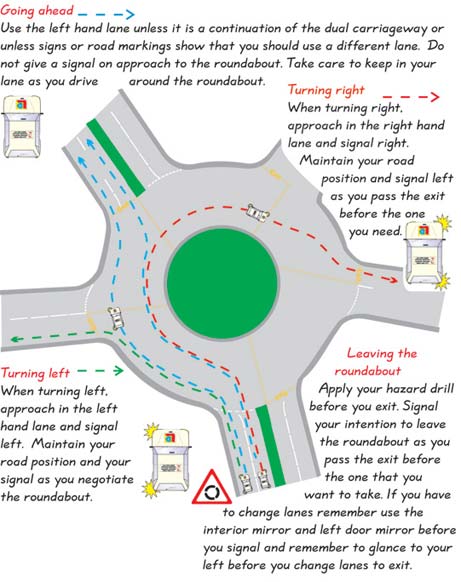 I asked DH this evening how he feels about driving around rotaries and his response was that he hates them. Not because he dislikes rotaries, but because he says drivers over here don't know how to navigate them properly, and they are too aggressive. He has experience of roundabouts in the UK (as a passenger, not a driver) and thinks they work well when people know how to use them.
I asked DH this evening how he feels about driving around rotaries and his response was that he hates them. Not because he dislikes rotaries, but because he says drivers over here don't know how to navigate them properly, and they are too aggressive. He has experience of roundabouts in the UK (as a passenger, not a driver) and thinks they work well when people know how to use them.American drivers in general have no idea how to drive around a roundabout (more usually called a rotary or traffic circle over here.) Apparently this has to do with the history of 'rotaries' because they did not originally give priority to the traffic on the rotary, nor were they necessarily seen as places where the traffic should slow down. Many American drivers have never encountered a rotary. Nowadays, because over the years rotaries have tended to become known as choke points or bad bottlenecks, there is enormous resistance nowadays when local authorities decide that a roundabout is needed. Interestingly, the word 'roundabout' tends to be used now instead of 'rotary' to highlight the fact that the design has changed.
Roundabout design in Britain changed in the 1960's to require that drivers on the roundabout have priority, and that drivers entering the rotary slow down, if not stop, before entering it. This design has worked much better than the American one, and in more recent years American highway departments have begun to use the British design. This diagram makes it look more complicated than it really is I think.
They're not really that complicated and used properly they do keep the traffic moving. Still, people who have no experience of them complain. Recent arguments against a rotary in my town include complaints that there will be extra noise for nearby residents from trucks braking and accelerating. Do they think that if there are traffic lights (sorry, a "signalized intersection"!) the trucks won't have to brake or accelerate? Puh-lease! This particular roundabout would go in at a very simple intersection - currently a "T-junction" - and the entrance to a local park would be altered so that it was also on the roundabout. Both roads are very busy only at certain times of day. A roundabout would be the perfect solution here as it keeps the traffic moving and no one would have to sit at a red light when there's no traffic or sit in frustration for 10 minutes waiting for some polite person to let them out. It does actually happen - there are some polite drivers around here, but almost inevitably they have someone impatient behind them who will try to pass on the inside and then cause an accident!
And after all, this is not a Magic Roundabout that's being proposed! That really would make most American drivers' heads spin!






6 comments:
I love roundabouts. I was afraid of them at first but they are great. People in the states don't know how to use them properly. You are right, they are very aggressive whereas over in the U.K. they are very courteous to other drivers. I have been honked at only a few times!
Ha i like it roundabouts...
___________________
Susana
We do your Marketing for best sales
Oh my God I have been on that roundabout!! We have 2 'rotaries' near my house (poss the only ones in Chicago) and I haven't seen one American car negotiate them properly yet, even tho they are incredibly simple. Take the shortest exit seems to be the most common tactic - even if that means going the wrong way. It doesn't matter, because any cars coming in the opposite direction take the same tack. The only issue happens when I happen to be at the roundabout and insist on doing it 'properly'. Chaos.
I've never really driven in the UK, so I have to say roundabouts kinda scare me!
I have been through that magic roundabout in Hemel many times and held tightly to the dashboard each time. Scary, spooky, and I don't see how even the locals get through there!
There was a great article on slate recently about this, trying to encourage American drivers to love roundabouts.
http://www.slate.com/id/2223035/
Having lost loved ones in a car crash involving a left-hand turn, I was thoroughly convinced by the safety argument.
Post a Comment